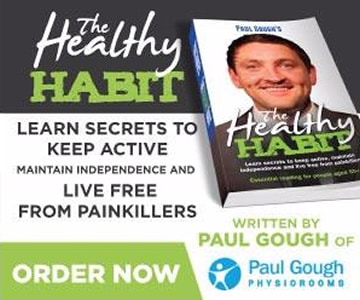Walking is one of the easiest forms of exercise and the health benefits are endless.
Walking is one of the most overlooked forms of exercise, it’s simple, free, and one of the best ways to get more active, become healthier, and lose weight without too much effort.
With the weather improving and restrictions easing, more and more people are out walking, so we’ve created a list of top tips to help protect your Calves and Achilles from extensive walking and getting more active. Tips you can use at home to prevent injuries whilst you are getting outside and enjoying the sunshine… as well as covering the benefits walking brings and why you should choose walking over driving and other forms of transport.
All our little health secrets are great for anyone, but they are essential reading for anyone aged 50+, and especially for those that are looking to get more active now the summer is here.
This blog post covers everything you’d possibly need to know about walking and getting on your feet, including:
- The benefits of walking and why you should choose walking over driving and other forms of transport (when possible)
- How to protect your Calves and Achilles.
- How to keep motivated with walking.
- Tips on how to walk without causing injuries and prevent damage to your essential joints and muscles.
- The benefits of Orthotics.
The benefits of walking…
Walking is one of the easiest forms of exercise as it’s free and easy to fit into your everyday routine, it also has some amazing benefits.
- Burns calories – Burning calories is essential for weight loss, which is what makes walking (especially brisk walking) such a great and easy way to get more active. Your calorie burn will depend on several factors, including walking speed, the distance you cover, your weight, and the terrain you’re walking on (uphill is better than flat tarmac if you want to exercise different muscle groups).
- Strengthen the heart – Walking for a minimum of 30 minutes a day, five days a week can help reduce your risk of coronary heart disease by 19%. This risk will reduce even more when you increase how long you walk for, and the distance you cover each day.
- Eases joint pain – Walking strengthens the muscles that support your vital joints, it also provides benefits to people who are particularly suffering from arthritis as it reduces pain through lubricating the joint through muscles.
- Boosts immune function and energy – Walking can help reduce your risk of developing a cold or flu as it helps to boost your immune system. People who walk, on average, have 43% fewer sick days and fewer upper respiratory tract infections, and if you do get sick, your symptoms are often lessened. Going for a walk when you’re tired, rather than grabbing a cup of coffee, can be more effective in boosting your energy levels, as it increases oxygen flow throughout your body and increases ‘feel-good’ endorphins.
- Improves your mood – Walking is a great way to improve your mental health as it can reduce anxiety, depression, and overall negative outlook. It also helps boost your self-esteem, which is great for confidence and an overall great mood.
- Extends your life – Yes, that’s right! Walking at an average pace compared to a slower, dawdling pace, reduces the risk of early death by 20%. This is due to increased cardiovascular health as you’re keeping active.
To find out our top 4 recommended walks, including how to get the kids and grandkids involved, CLICK HERE to head to our blog post to find out more information.
How to protect your Calves and Achilles…
Protecting your Calves and Achilles is essential to keep you walking, but they’re also some of the most common places for walking injuries to occur. Your best chances of reducing painful injuries in these areas are by:
- Warming up correctly for at least 20 minutes, you can do this by stretching.
- Following cool-down stretches correctly, this recovery period helps your muscles acclimate after exercise.
- Make sure you’re eating and drinking the correct amount, when your body is short of healthy fuel, fatigue can set in, which often causes cramps (which can lead to more drastic injuries!)
To find out how to warm up and stretch properly, CLICK HERE to read our blog post and watch a FREE stretching demonstration video by our Senior Physiotherapist Jonny.
How to keep motivated with walking
Keeping motivated is something that many people struggle with, especially when other tasks take priority, such as jobs around the house or visiting friends and family. But remember you’re still walking whilst doing these activities. Try to aim for 10,000 steps a day to keep your body healthy.
The easiest way to make sure that you’re staying active is to turn walking into a healthy habit, and you can do this by thinking of how you can include walking in your daily routine. Here are some of our favourites:
- Walk part of your journey to work or to the shops.
- Try and use the stairs than the lift more often, whenever possible.
- Leave your car behind for short journeys.
- Walk the kids and grandkids to school, get them involved!
- Try and catch up with friends through exercise, suggest a walk rather than a trip to the coffee shop.
Tips on how to walk without causing injuries and prevent damage to your essential joints and muscles…
Aftercare is one of the most important things when it comes to keeping your vital joints and muscles healthier (and pain-free!) for longer. By following the correct care after a long walk, you can be preventing damage that could stop you from enjoying the outdoors AT ALL. Did you know that walking also decreases the risk of arthritis?
Here are just a few ways you can prevent knee and ankle injuries:
- Use ice – If you feel that nagging pain beginning, or notice slight swelling, make sure to apply ice wrapped in a tea towel for 20-minute intervals. This will reduce swelling and tenderness in the area, along with helping the muscles to cool down and return to their natural state.
- Take it easy – Remember that we’ve been in lockdown for 16 months, your exercise levels may not be what they were 2 years ago. Make sure you take it easy and know your limits!
- Pick the right shoes – The problem is you’ll never know what’s happening until you see some swelling or feel the heat coming from your knee. I assure you, your knee is under much more added stress if your footwear isn’t protecting it by absorbing some of the shock from the pavement and keeping it in a steady position.
The benefit of Orthotics…
Foot orthotics can also be a great option, especially if you’re looking to get more active. We’ve been helping lots of patients with orthotics in our Darlington, Durham, Guisborough, and Hartlepool physio clinics recently that have been struggling but are wanting to get more active now that summer is here, and restrictions are easing.
Orthotics can benefit everyone. They don’t only help people that go out and exercise, people also wear them day to day to help with their alignment and posture.
Feet are the foundation of your body, so if anything is out of sync then it can have a huge impact on the rest of your posture, movement, and stability.
Paul always says “You wouldn’t build a house on sand. And it’s the same with your body too!”
Here’s a little insight into what happens in an Orthotics appointment with Paul Gough Physio Rooms…
- Prescription foot orthotics are made bespoke to you.
- Our physiotherapist would do a full assessment, which involves using our state-of-the-art non-contact scanner to take a scan of your feet.
- This scan then enables us to create something bespoke to you and the contours of your feet.
Wearing custom-made foot orthotics, in many cases, especially if you’re aged 50+, will help you continue to wear your favourite shoes whilst keeping your joints protected and allow you to safely remain active. If you have any questions about orthotics, feel free to contact us using the details below.

We are here for you…
If you’re in pain and would like to talk to us about getting some help, some specialist advice, or if you are looking for a diagnosis, remember we are always here to help you.
We are safely offering both face-to-face and virtual appointments, as well as FREE taster sessions for anyone that is ‘unsure’ if physio is right for them.
If you would like to get one of our limited slots, please click here to complete our enquiry form or CALL us on 01429 866771.

